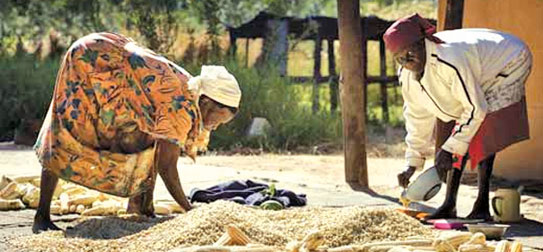Climate change to hit world hunger by 20%
Currently around 870 million people in the world do not receive
enough food to live healthily, equivalent to one in eight of the world's
population.
 |
|
African women removing
corn from the cob |
A new report by Oxfam has now found that this number could increase
by as much as 20% as climate change causes average income to fall, food
prices to rise, and the nutritional quality of food to fall.
Head of policy for Oxfam's GROW campaign, Tim Gore said, "Just as the
evidence of man-made climate change is becoming stronger, so too is our
understanding of how it hits people, especially around hunger."
"We've long known that climate change will mean lost crops, but
increasingly we're seeing its impact through higher food prices, lower
earnings, more health problems and lower quality food, too," he said.
The Intergovernmental Panel on Climate Change (IPCC) is the top
authority on climate change, studying all the effects on human life; but
Oxfam focuses entirely on the effect on food availability, claiming that
it can doom harvests by causing floods, droughts, heat waves and cold
snaps.
Oxfam's report said, "The changing climate is already jeopardising
gains in the fight against hunger, and it looks set to worsen. If the
remainder of the 21st century unfolds like its first decade, we will
soon experience climate extremes well outside the boundaries of human
experience, ever since agriculture was first developed."
The current rate at which the global climate is changing, coupled
with the population of over seven billion, and growing, the planet's
ability to provide enough food to feed us all is stretching ever thinner
and 10-20% more people could suffer from hunger by 2050.
Oxfam said that while poorer countries will be the worst affected, it
is a global problem and, therefore, disasters in third world countries,
such as the 2011 floods in Australia, and the 2012 droughts in Russia
and the US, will become more common occurrences.
Oxfam also explains that as crops fail the smaller harvests will lead
to higher prices. The UK Institute of Development Studies said, "The
average price of staple foods could more than double in the next 20
years compared with 2010 trend prices, with up to half of the increase
caused by climate change." |

